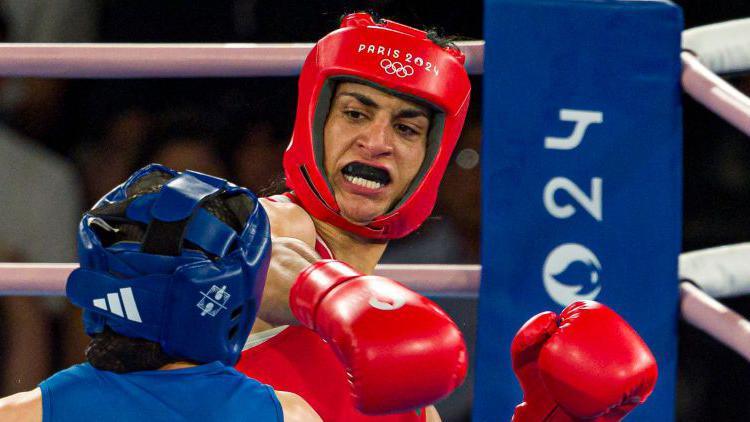Khelif required to take sex test for World Boxing fights

Imane Khelif won welterweight gold at the Olympic Games in Paris last year
Timothy Abraham
BBC Sport journalist
Olympic champion Imane Khelif will not be allowed to fight in the female category at World Boxing competitions until she undergoes a mandatory sex test.
Khelif, 26, won women’s welterweight gold at the Paris Olympics last year amid a row over gender eligibility.
Algeria’s Khelif, along with Taiwanese fighter Lin Yu-ting, was disqualified from the 2023 World Championships by previous world governing body the International Boxing Association (IBA) for allegedly failing gender eligibility tests.
She was cleared to compete in Paris by the International Olympic Committee (IOC), which stripped the IBA of its status as the sport’s amateur world governing body in June 2023 over concerns over how it was run.
The IOC said competitors were eligible for the women’s division in Paris if their passports said they were female.
On Friday, World Boxing said that “all athletes over the age of 18” who wish to participate in competitions it owns or sanctions will “need to undergo a PCR (polymerase chain reaction) genetic test to determine their sex at birth and their eligibility to compete”.
Khelif, had been set to make her competitive comeback at the Eindhoven Box Cup from 5-10 June.
Khelif has always competed in the women’s division and there is no suggestion she identifies as anything other than a woman.
Some reports took the IBA stating that Khelif has XY chromosomes to speculate she might have differences of sexual development (DSD) like runner Caster Semenya.
However, the BBC has not been able to confirm whether this is or is not the case.
The IOC made it clear last year this is “not a transgender case”.
What has World Boxing said?
World Boxing was granted provisional recognition as the sport’s international governing federation by the IOC in February 2025.
“The introduction of mandatory testing will be part of a new policy on ‘sex, age and weight’ to ensure the safety of all participants and deliver a competitive level playing field for men and women,” the World Boxing statement said.
“The policy is in the final stages of development and has been crafted by a specially convened working group of the World Boxing medical and anti-doping committee, which has examined data and medical evidence from an extensive range of sources and consulted widely with other sports and experts across the world.”
The statement added that World Boxing “respects the dignity of all individuals” and its overriding priority was “to ensure safety and competitive fairness to all athletes”.
“To do this, it is essential that strict categories, determined by sex are maintained and enforced, and means that World Boxing will only operate competitions for athletes categorised as male or female,” it said.
“This decision reflects concerns over the safety and wellbeing of all boxers, including Imane Khelif, and aims to protect the mental and physical health of all participants.”
In its statement, World Boxing published a letter it had sent to both Khelif and the Algerian Boxing Federation.
In the letter World Boxing said the new eligibility rules were developed “with the express purpose of safeguarding athletes in combat sports” given the “physical risks associated with Olympic-style boxing”.
It also said in the letter that in “the event the athlete’s sex certification is challenged by the athlete’s federation or by World Boxing” the athlete shall be “ineligible to compete until the dispute is resolved”.
Background – Khelif’s controversial gold
The gender eligibility tests on Khelif that led to her disqualification from the 2023 World Championships were conducted by the Russian-led IBA.
The IBA said Khelif “failed to meet the eligibility criteria for participating in women’s competition”.
The IOC questioned the legitimacy and credibility of the IBA’s tests, saying they could not be relied upon.
Khelif and Lin both went on to win gold in Paris, with their story becoming the central focus of boxing at the games, attracting scrutiny and criticism from around the world.
Boxing has featured at every Olympics since 1904, except 1912, but the IOC has run the sport at the past two Games.
The sport was initially not part of the programme for LA 2028 when the schedule was first announced in 2022.
But the IOC granted provisional recognition for World Boxing as the sport’s global governing body earlier this year before voting for its inclusion.
In February 2025, the IBA launched a legal case against the IOC or allowing Khelif to compete citing safety concerns over gender eligibility.
Khelif called them “baseless accusations that are false and offensive”.
What is DSD?
DSD is a group of rare conditions, whereby a person’s hormones, genes and/or reproductive organs may be a mix of male and female characteristics.
Some of those affected prefer the term “intersex”, which is an umbrella term used to describe people who are born with biological variations in their sex characteristics that don’t fit typical male or female categories.
Other sports have rules in place for athletes with DSD, whose elevated testosterone levels can lead to increased muscle mass and strength.
World Athletics, for example, only allows athletes with DSD to compete in female track events if they reduce their testosterone levels.
How will testing take place?
World Boxing provided a detailed explanation about the testing in its statement.
“The PCR test is a laboratory technique used to detect specific genetic material, in this case the SRY gene, that reveals the presence of the Y chromosome, which is an indicator of biological sex,” it said.
“The test can be a be conducted by nasal/mouth swab, saliva or blood.
“Athletes that are deemed to be male at birth, as evidenced by the presence of Y chromosome genetic material (the SRY gene) or with a difference of sexual development (DSD) where male androgenization occurs, will be eligible to compete in the male category.
“Athletes that are deemed to be female at birth, as evidenced by the presence of XX chromosomes or the absence of Y chromosome genetic material (the SRY gene) or with a DSD where male androgenization does not occur, will be eligible to compete in the female category.”
Under the new policy, national federations will be responsible for testing and will be required to confirm the sex of their athletes when entering them into World Boxing competitions by providing a certification of their chromosomal sex, as determined by a PCR test.
World Boxing said failure to provide that will render the athlete “ineligible to compete” and may lead to sanctions against the athlete or their national federation.
The organisation added: “Where test results for boxers that want to compete in the female category reveal Y chromosome genetic material and a potential DSD, the initial screenings will be referred to independent clinical specialists for genetic screening, hormonal profiles, anatomical examination or other valuation of endocrine profiles by medical specialists.
“As part of its new policy World Boxing will reserve the right to do genetic sex screening on new or existing athlete samples to confirm certification.
“The policy will include an appeals process. Support will be offered to any boxers that provide an adverse test result.”







